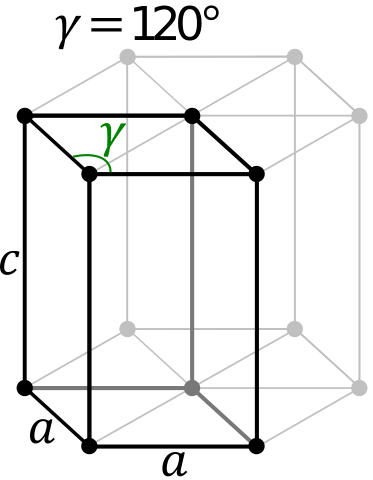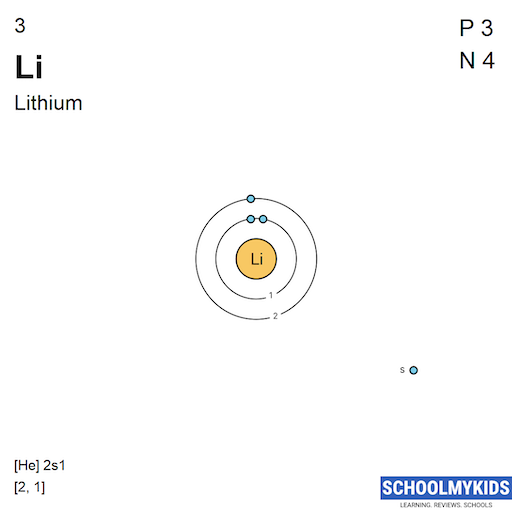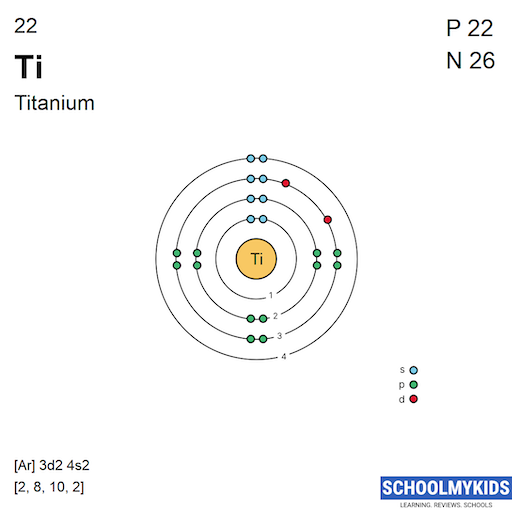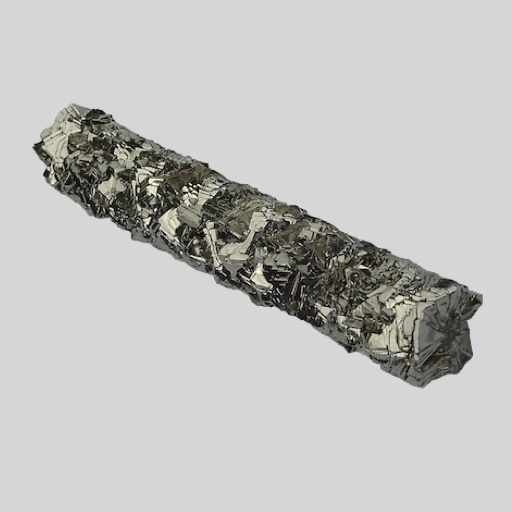Periodic Table Element Comparison: Compare Elements - Lithium vs Titanium
Compare Lithium and Titanium
Compare Lithium and Titanium on the basis of their properties, attributes and periodic table facts. Compare elements on more than 90 properties. All the elements of similar categories show a lot of similarities and differences in their chemical, atomic, physical properties and uses. These similarities and dissimilarities should be known while we study periodic table elements. You can study the detailed comparison between Lithium vs Titanium with most reliable information about their properties, attributes, facts, uses etc. You can compare Li vs Ti on more than 90 properties like electronegativity , oxidation state, atomic shells, orbital structure, Electronaffinity, physical states, electrical conductivity and many more.
Facts
| Name | Lithium | Titanium |
| Atomic Number | 3 | 22 |
| Atomic Symbol | Li | Ti |
| Atomic Weight | 6.941 | 47.867 |
| Phase at STP | Solid | Solid |
| Color | Silver | Silver |
| Metallic Classification | Alkali Metal | Transition Metal |
| Group in Periodic Table | group 1 | group 4 |
| Group Name | lithium family | titanium family |
| Period in Periodic Table | period 2 | period 4 |
| Block in Periodic Table | s -block | d -block |
| Electronic Configuration | [He] 2s1 | [Ar] 3d2 4s2 |
| Electronic Shell Structure (Electrons per shell) | 2, 1 | 2, 8, 10, 2 |
| Melting Point | 453.69 K | 1941 K |
| Boiling Point | 1615 K | 3560 K |
| CAS Number | CAS7439-93-2 | CAS7440-32-6 |
| Neighborhood Elements | Neighborhood Elements of Lithium | Neighborhood Elements of Titanium |
History
| Name | Lithium | Titanium |
| History | The element Lithium was discovered by A. Arfwedson in year 1817 in Sweden. Lithium derived its name the Greek word lithos, meaning 'stone'. | The element Titanium was discovered by W. Gregor in year 1791 in United Kingdom. Titanium derived its name from Titans, the sons of the Earth goddess of Greek mythology. |
| Discovery | A. Arfwedson (1817) | W. Gregor (1791) |
| Isolated | W. T. Brande (1821) | J. Berzelius (1825) |
Presence: Abundance in Nature and Around Us
Parts per billion (ppb) by weight / by atoms (1ppb =10^-7 %)
| Name | Lithium | Titanium |
| Abundance in Universe | 6 / 1 | 3000 / 80 |
| Abundance in Sun | 0.06 / 0.01 | 4000 / 100 |
| Abundance in Meteorites | 1700 / 4600 | 550000 / 230000 |
| Abundance in Earth's Crust | 17000 / 50000 | 6600000 / 2900000 |
| Abundance in Oceans | 180 / 160 | 1 / 0.13 |
| Abundance in Humans | 30 / 27 | - / - |
Crystal Structure and Atomic Structure
| Name | Lithium | Titanium |
| Atomic Volume | 13.02 cm3/mol | 10.621 cm3/mol |
| Atomic Radius | 167 pm | 176 pm |
| Covalent Radius | 134 pm | 136 pm |
| Van der Waals Radius | 182 pm | - |
| Atomic Spectrum - Spectral Lines | ||
| Emission Spectrum |  |  |
| Absorption Spectrum |  |  |
| Lattice Constant | 351, 351, 351 pm | 295.08, 295.08, 468.55 pm |
| Lattice Angle | π/2, π/2, π/2 | π/2, π/2, 2 π/3 |
| Space Group Name | Im_ 3m | P63/mmc |
| Space Group Number | 229 | 194 |
| Crystal Structure | Body Centered Cubic  | Simple Hexagonal  |
Atomic and Orbital Properties
| Name | Lithium | Titanium |
| Atomic Number | 3 | 22 |
| Number of Electrons (with no charge) | 3 | 22 |
| Number of Protons | 3 | 22 |
| Mass Number | 6.941 | 47.867 |
| Number of Neutrons | 4 | 26 |
| Shell structure (Electrons per energy level) | 2, 1 | 2, 8, 10, 2 |
| Electron Configuration | [He] 2s1 | [Ar] 3d2 4s2 |
| Valence Electrons | 2s1 | 3d2 4s2 |
| Oxidation State | 1 | 2, 3, 4 |
| Atomic Term Symbol (Quantum Numbers) | 2S1/2 | 3F2 |
| Shell structure |  |  |
Isotopes and Nuclear Properties
Lithium has 2 stable naturally occuring isotopes while Titanium has 5 stable naturally occuring isotopes.
| Name | Lithium | Titanium |
| Known Isotopes | 3Li, 4Li, 5Li, 6Li, 7Li, 8Li, 9Li, 10Li, 11Li, 12Li | 38Ti, 39Ti, 40Ti, 41Ti, 42Ti, 43Ti, 44Ti, 45Ti, 46Ti, 47Ti, 48Ti, 49Ti, 50Ti, 51Ti, 52Ti, 53Ti, 54Ti, 55Ti, 56Ti, 57Ti, 58Ti, 59Ti, 60Ti, 61Ti, 62Ti, 63Ti |
| Stable Isotopes | Naturally occurring stable isotopes: 6Li, 7Li | Naturally occurring stable isotopes: 46Ti, 47Ti, 48Ti, 49Ti, 50Ti |
| Neutron Cross Section | 0.045 | 6.1 |
| Neutron Mass Absorption | - | 0.0044 |
Chemical Properties: Ionization Energies and electron affinity
| Name | Lithium | Titanium |
| Valence or Valency | 1 | 4 |
| Electronegativity | 0.98 Pauling Scale | 1.54 Pauling Scale |
| Electron Affinity | 59.6 kJ/mol | 7.6 kJ/mol |
| Ionization Energies | 1st: 520.2 kJ/mol 2nd: 7298.1 kJ/mol 3rd: 11815 kJ/mol | 1st: 658.8 kJ/mol 2nd: 1309.8 kJ/mol 3rd: 2652.5 kJ/mol 4th: 4174.6 kJ/mol 5th: 9581 kJ/mol 6th: 11533 kJ/mol 7th: 13590 kJ/mol 8th: 16440 kJ/mol 9th: 18530 kJ/mol 10th: 20833 kJ/mol 11th: 25575 kJ/mol 12th: 28125 kJ/mol 13th: 76015 kJ/mol 14th: 83280 kJ/mol 15th: 90880 kJ/mol 16th: 100700 kJ/mol 17th: 109100 kJ/mol 18th: 117800 kJ/mol 19th: 129900 kJ/mol 20th: 137530 kJ/mol 21st: 602930 kJ/mol 22nd: 639294 kJ/mol |
Physical Properties
| Name | Lithium | Titanium |
| Density | 0.535 g/cm3 | 4.507 g/cm3 |
| Molar Volume | 13.02 cm3/mol | 10.621 cm3/mol |
Elastic Properties | ||
| Young Modulus | 4.9 | 116 |
| Shear Modulus | 4.2 GPa | 44 GPa |
| Bulk Modulus | 11 GPa | 110 GPa |
| Poisson Ratio | - | 0.32 |
Hardness - Tests to Measure of Hardness of Element | ||
| Mohs Hardness | 0.6 MPa | 6 MPa |
| Vickers Hardness | - | 970 MPa |
| Brinell Hardness | - | 716 MPa |
Electrical Properties | ||
| Electrical Conductivity | 11000000 S/m | 2500000 S/m |
| Resistivity | 9.4e-8 m Ω | 4e-7 m Ω |
| Superconducting Point | - | 0.4 |
Heat and Conduction Properties | ||
| Thermal Conductivity | 85 W/(m K) | 22 W/(m K) |
| Thermal Expansion | 0.000046 /K | 0.0000086 /K |
Magnetic Properties | ||
| Magnetic Type | Paramagnetic | Paramagnetic |
| Curie Point | - | - |
| Mass Magnetic Susceptibility | 2.56e-8 m3/kg | 4.01e-8 m3/kg |
| Molar Magnetic Susceptibility | 1.78e-10 m3/mol | 1.919e-9 m3/mol |
| Volume Magnetic Susceptibility | 0.00000137 | 0.0001807 |
Optical Properties | ||
| Refractive Index | - | - |
Acoustic Properties | ||
| Speed of Sound | 6000 m/s | 4140 m/s |
Thermal Properties - Enthalpies and thermodynamics
| Name | Lithium | Titanium |
| Melting Point | 453.69 K | 1941 K |
| Boiling Point | 1615 K | 3560 K |
| Critical Temperature | 3223 K | - |
| Superconducting Point | - | 0.4 |
Enthalpies | ||
| Heat of Fusion | 3 kJ/mol | 18.7 kJ/mol |
| Heat of Vaporization | 147 kJ/mol | 425 kJ/mol |
| Heat of Combustion | -298 J/(kg K) | - |
Regulatory and Health - Health and Safety Parameters and Guidelines
| Name | Lithium | Titanium |
| CAS Number | CAS7439-93-2 | CAS7440-32-6 |
| RTECS Number | RTECSOJ5540000 | - |
| DOT Hazard Class | 4.3 | 4.2 |
| DOT Numbers | 1415 | 2546 |
| EU Number | - | - |
| NFPA Fire Rating | 2 | 1 |
| NFPA Health Rating | 3 | 1 |
| NFPA Reactivity Rating | 2 | 2 |
| NFPA Hazards | Water Reactive | - |
| AutoIgnition Point | 179 °C | 250 °C |
| Flashpoint | - | - |


